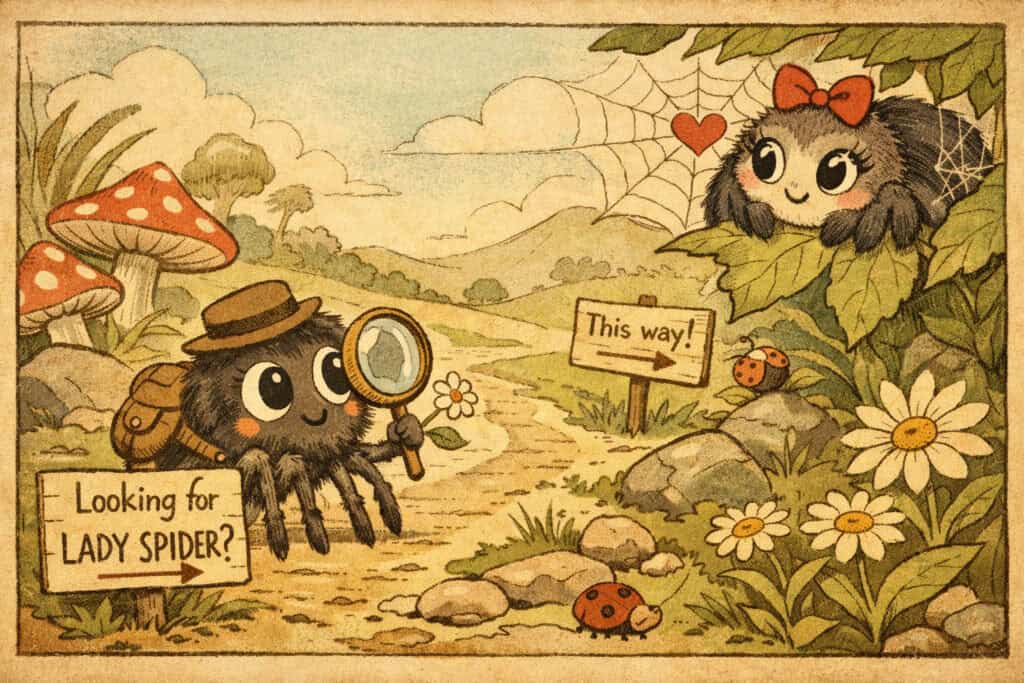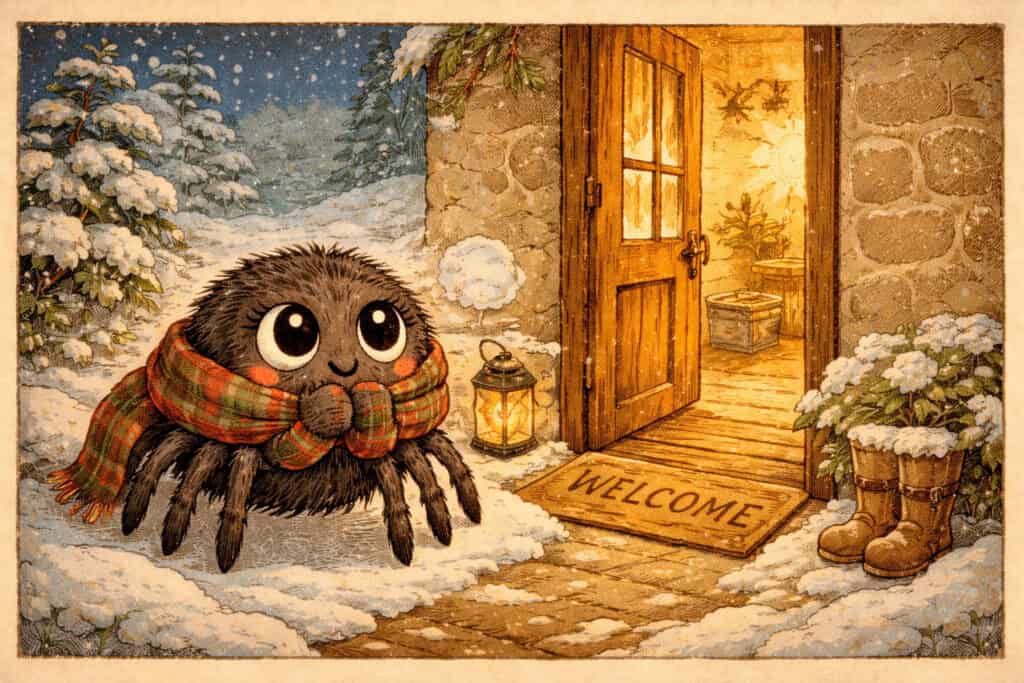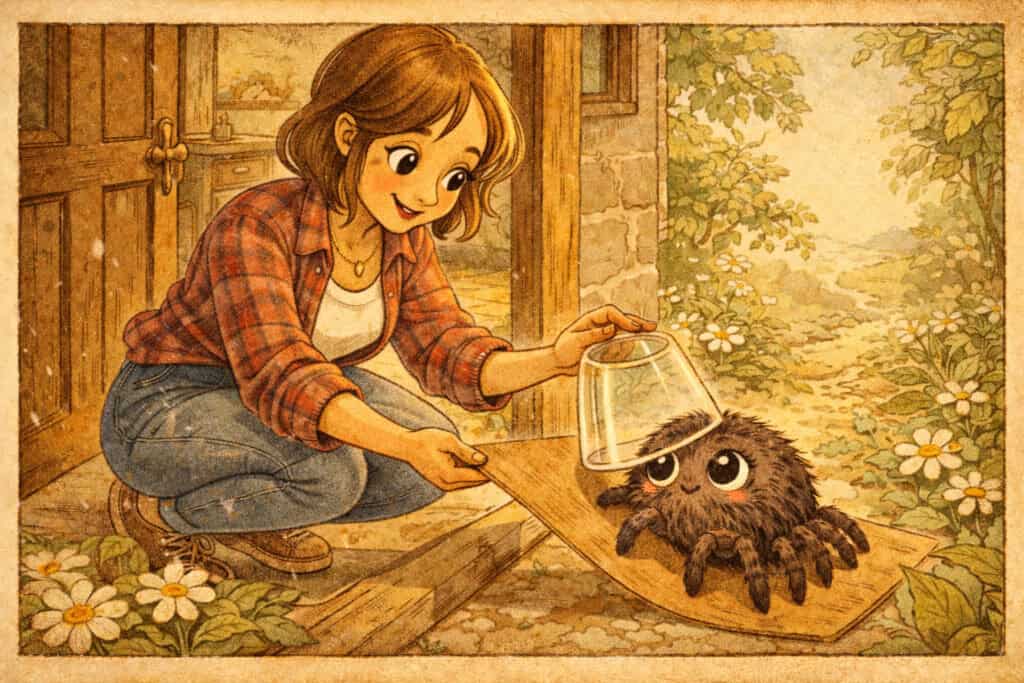Spider Season
As the summer fades and the cool breeze of autumn begins to make its presence felt, homeowners across the UK brace themselves for the inevitable arrival of spider season. Suddenly far more spiders are found scurrying about. This period, filled with an uptick in arachnid activity, can be a cause of concern for many. However, spider season doesn’t have to necessarily be a time for dread.
Let’s take a moment to explore when spider season occurs, the reasons behind it and how to cope with it in a positive way. The key to overcoming fear is transforming it into fascination. Hopefully I can build some deeper understanding for our eight-legged visitors and provide tools to embrace them with courage.
What is Spider Season?

Spider season refers to the time of year when spiders become most visible and active. It is not just a UK phenomenon but happens in many places around the world. During this period, typically late summer to early autumn, spiders are more likely to be seen scuttling across floors instead of just sitting on their webs like usual. Several factors contribute to this surge in spider activity:
- Mating Season: The primary reason for increased spider visibility during this time is their mating season, spider sexy time! Male spiders venture out in search of females, leading to more frequent sightings inside our homes. It is a very female-dominant world for spiders as the males have to do all the work to find a mate!
- Temperature Changes: As temperatures drop, some spider species seek warmer environments, sometimes finding their way indoors. However, most species are just fine in the cold.
- Humidity Levels and Weather Changes: Spiders thrive in humid conditions. The transition from summer to autumn, with its fluctuating humidity, can cause spiders to move more. More wind and rain can also cause movements, as webs can be more easily destroyed
When is Spider Season in the UK?
In the UK, spider season generally spans from August to October, with peak activity observed in September. The exact timing can vary depending on the weather and environmental conditions each year. In the UK, we can have very different summers from year to year, some being mostly hot and dry, others being cooler and rainier. Weather conditions play a crucial role in determining the start and end of the spider season. A warm, dry summer followed by a cool, damp autumn can extend the season, while an unusually cold or wet summer might shorten it.
Spiders are highly adaptable creatures, and their activity levels can fluctuate based on these environmental factors. Sometimes, the male spiders can start hunting for females as early as June or July. And in other situations, they can still be searching as late as November.
Peak Spider Season Activity in September
September is the month when spiders are most active. This heightened activity is due to the mating season reaching its zenith. Once the male is fully matured, he only has a short time to find a female, usually only a couple of months. Male spiders mature more quickly and live much shorter lives than female spiders to decrease the chance of siblings mating. Usually, the males are maturing no later than August and are ready to hook up with the females by September. This is why we have increased sightings in homes during September.
Spider Mating Season (Spider Sexy Time!)

Spider season is really the spider mating season, which is a fascinating aspect of arachnid behaviour. During this time, male spiders leave their webs in search of receptive females. This period is not only crucial for the continuation of their species but also a significant factor in the increased spider sightings during spider season.
Interesting Facts About Spider Mating and Reproduction
- Pedipalps: Male spiders use specialized appendages called pedipalps to transfer sperm to the female. First, the male will make something called a sperm web. This is where he ejaculates into the web, then sucks up the sperm into his specially adapted pedipalps. Pedipalps are kind of like the ‘hands’ of the spider, the little short legs at the front. When not mating, spiders use them to help themselves eat.
- Mating Rituals: Male spiders perform intricate courtship rituals to attract females, often involving dances and making calculated vibrations on the females’ web. If he is lucky, he will not be devoured by the female and she will let him mate with her. It just depends on how hungry she is or if she has already been mated with. If he is REALLY lucky, he will escape being eaten by her after mating and maybe find another female to mate with. As I said, it’s a very female-dominated world with spiders!
- Egg Sacs: After mating, female spiders lay eggs in silk sacs, which they carefully guard until the spiderlings hatch. A female spider only has to mate once to produce multiple egg sacs. Essentially, she can store the sperm and impregnate herself any time she likes! (Which is usually all the time.)
If you want to find out even more about spiders’ unique mating behaviours, check out this article.
Why Do Spiders Come Inside?
Spiders entering homes during spider season is a common occurrence. But why do they do this? Many people think it is on purpose and that spiders would prefer it inside of our homes. But actually, this could not be further from the truth. Our homes are not very suitable environments for spiders. Most of us do not want damp homes, so spiders often dry out when inside our homes from the heating and a lack of moisture. This is why we see them in the bathrooms so often: the poor spiders are desperate for a drink. Also, there are not a lot of insects to eat inside our homes or mates. Additionally, there is a lot more danger with humans and pets!
Spiders come into our houses mainly for two reasons:
- Spiders are very numerous
- Male spiders wander desperately trying find a mate. They do not understand the concept of inside or outside, so they are just accidentally wandering into our homes. Moreover, most spiders can’t see very well at all. Additionally, all spiders are deaf. So out of their webs, they really are just bumbling around, not really knowing or understanding where they are heading.
Imagine being nearly blind, deaf, and completely lost. Not only that, but everyone hates you and either wants to kill you or eat you. Not a very fun existence, in fact, incredibly terrifying! The best thing we can do for our arachnid friends is capture them with a card and a cup and help them get back outside. They have a very important job to do in nature after all!

Entry Points
Spiders can enter homes through various entry points, including:
- Cracks in walls or foundations
- Gaps around windows and doors
- Vents and chimneys
- Openings around pipes and wiring
- Spaces under the door
Spiders do not come up from the plumbing; that is only a myth! The only reason they would climb out of a sink or bath drain is that it either fell accidentally or was washed down on purpose! Washing a spider down the drain is not only cruel but pointless. They have an insteresting super power of being able to use the hair on their bodies to create air bubbles. This enables them survive many drowning situations.
Managing Spider Presence in Your Home
Here at Creature Courage, we want to encourage compassion and a respectful relationship with spiders. However, we understand that still means you ideally don’t want them in your home. Additionally, it is also better for the spider to be outside to live its natural life and keep insect populations down. Keeping spiders out of your home requires a combination of preventative measures and active management.

Here are some practical tips to help you maintain a spider-free environment during spider season. However, complete prevention is going to be near impossible, as not opening your windows for fresh air is not advised. Additionally, these are all temporary measures. Although these tips can minimise spiders coming into your house, learning to just accept spiders and help them back outside is a better mindset.
Preventative Measures
- Seal Entry Points: Inspect your home for cracks, gaps, and openings, and seal them with caulk or weatherstripping.
- Keep Your Home Clean: Regular cleaning reduces the number of hiding spots and food sources for spiders. Pay attention to corners, under furniture, and behind appliances.
- Reduce Clutter: Minimize clutter in your home, as it provides ideal hiding spots for spiders.
Natural Methods to Help With Spider Season
- Essential Oils: Use essential oils like peppermint, eucalyptus, and tea tree oil, which are known to repel spiders without hurting them. Mix a few drops with water and spray around entry points and spider-prone areas.
- Vinegar: Vinegar is another natural repellent. Mix equal parts vinegar and water and spray it in areas where spiders are likely to enter.
Of course, we would never recommend using chemical methods for killing spiders. This is not only cruel but can create toxins in your own home that can endanger pets and other wildlife. Many of these toxins can be dangerous to humans as well if it contaminates food.
Getting Over the Fear of Spiders is the Best Method
All of the above methods, though natural and safe, run the risk of just increasing your anxiety. Over-focusing on keeping spiders out and putting a lot of thought and effort into it is actually just putting a lot of thought and effort into fear. You are accidentally reinforcing the idea that spiders are a real threat to your survival instinct, part of your brain. This can cause a spider phobia to get worse. You can read more about why it is so important to face your fears in this article we wrote.
Additionally, as mentioned, no avoidance strategy will keep all spiders out of your house, so it is a losing battle that can consume your mind. Getting therapy to feel more relaxed and calmer, and even ambivalent around spiders, is a much better way. Then spider season stops becoming a fixation of fear for months and just becomes a normal part of life.
We can also embrace spiders as something positive when we learn how much good they are actually doing for the environment and keeping insects at bay. Check this blog post out and learn how spiders are just as important for the environment as the bees! We need spiders to survive. Understanding this can help build compassion and inspiration to help them get back outside where they belong.
Creature Courage: Get Over Your Fear of Spiders in Just One Day!

Creature Courage is the UK’s leading arachnophobia therapy. We run the Spider Courage Experience to powerfully transform our clients’ relationship with spiders. We have a 99% success rate of getting people over their fears in just one day! This is because our therapy is based on neuroscience with proven methods and proven results. Our therapy will not only help you get over your spider phobia but will also help you address your overall mental health. We are very holistic in our approach, as we know all anxiety triggers are connected. You will develop better habits around all anxiety and learn how to become a more courageous person.
You will have a completely new understanding and feeling towards spiders, finding them fascinating and important creatures in our ecosystems. We will help you to also build compassion for spiders that will help you overcome your fear for good. So, there is no need to keep dreading spider season when a phobia can be easily cured!
Life is too short to live in fear! Especially as there is an effective solution that is both quick and fun! Join us for the Spider Courage Experience this summer and autumn and embrace spider sexy time as a positive life-changing opportunity. Contact us today for your free consultation to find out more.
Ps. The cool spider cartoon art is by illustrator Christine Fleming.

FAQs About Spider Season in the UK

When is spider season in the UK?
Spider season typically occurs from late summer to early autumn, with peak activity in September.
How long does spider season last?
Spider season usually lasts for a few months, generally from August to October.
Why do spiders come inside homes?
Spiders accidentally come inside, not on purpose. This is due to them being very numerous and the males leaving their webs to wander to try to find a mate.
What attracts spiders to houses?
As mentioned, most spiders are not attracted to our houses, though some species do prefer the warmth. Our houses are usually a very bad environment for them with a lack of moisture, food, and increased danger from humans and pets. Coming into our houses is usually just an accident.
How can I keep spiders out of my house?
Keep your home clean and clutter-free, seal entry points, use natural methods like peppermint oil, and maintain a dry environment. However, it will be impossible to fully keep spiders out of your house. So, actually, getting therapy to not care if they come inside is the best method of all!
When does spider season end?
Spider season typically ends by late autumn, around October, the latest November depending on weather conditions.
What month are spiders most active?
Spiders are most active in September.
How do spiders mate?
Spiders have a unique mating process involving the transfer of sperm via pedipalps. Pedipalps are the short-looking legs at the front of the spider.
What are some natural ways to deter spiders?
Use essential oils like peppermint, keep your home clean, and remove spider webs regularly.

